#(we only root against it on principle
Explore tagged Tumblr posts
Text
i think one of the biggest reasons the mimic grates on so many people (including myself) is because it's pay-off without set-up. like. you can have a story about a machine that recreates the horrors of the past in a metaphor for the cycle of abuse & how trauma bleeds into future generations, sure, but you need to write that story first. you don't get to work backwards from your twist! that's not how stories work!!
#speaking!#discourse#also like most of the thematic stuff was done better earlier in the franchise#(CIRCUS BABY)#while shifting away from characters who actually embody those themes (VANESSA)#& how utterly sauceless it is as an antagonist#(it's a monster that never does anything truly bad on-screen)#(we only root against it on principle#not bc it's actually done anything BAD#besides like. implied murders & heavily de-emphasised psychological abuse)#you hate it bc it's evil. not bc it's done anything to earn that hate.#and it isn't even FUN ABOUT IT
54 notes
·
View notes
Text
In the Presence of Truth {"Sage of Truth" (SMC) x Reader} PT 1
(disclaimer: I envision the academy to be more of a college setting everyone is an adult in this story)
The grand lecture hall of Blueberry Yogurt Academy was alive with the quiet rustle of parchment and the scratch of quills. Golden candlelight flickered against stained glass windows, casting soft shadows over rows of students hunched over their desks, diligently transcribing notes. The air smelled of old books, melted wax, and a faint trace of ink. You sat near the middle far enough from the front to avoid your professor’s direct scrutiny, yet not so far that you could escape his line of sight entirely. Despite your best efforts to keep up, the equations scrawled across the massive chalkboard blurred together into an indecipherable mess. Your quill hovered hesitantly over your notes, your parchment an uneven battlefield of crossed-out mistakes and half-formed thoughts. Professor Almond Custard Cookie stood at the front, the very embodiment of patience. He was a well-respected scholar, known for his gentle demeanor and dedication to his students. His robes, embroidered with constellations, shimmered faintly as he gestured toward the board, explaining the intricacies of magical resonance theory with practiced ease. “Now, if we consider the fluctuation in mana flow when exposed to unstable astral properties…” His voice was steady, warm, inviting understanding. The class nodded along, following his train of thought. You, however, found yourself lost. Again. Your parchment was a disaster. The numbers weren’t aligning, and no matter how much you tried to trace back to where you went wrong, the logic continued to slip through your grasp. You tapped your quill against the desk, willing the knowledge to take root in your mind.
“Let’s test our understanding,” professor Almond Custard Cookie said, turning toward the class. “If one were to stabilize a fluctuating mana field under a lunar eclipse, what key principle must be applied to prevent collapse?” A silence hung in the air, the pause filled only by the quiet shifting of students preparing to answer. You ducked your head slightly, praying someone else would speak first. But then…“(y/n) cookie, why don’t you give it a try?” Your stomach twisted into a knot. You could feel the weight of every gaze turning toward you, the quiet anticipation of your classmates pressing down. You swallowed, your throat dry. You scrambled for an answer, flipping through your notes in desperation. You knew you had studied this. You had read the chapter, listened to the lectures. But now, under you professor’s expectant gaze, your thoughts tangled into a panicked blur. “I, um… Is it… increasing the leyline attunement?” you ventured, your voice barely above a whisper. A pause. Professor Almond Custard Cookie gave a long, measured sigh. Not of anger, nor disappointment, just exhaustion. The kind that had been building for weeks. “Not quite,” he said gently, rubbing the bridge of his nose. “We’ve gone over this concept multiple times. Think back to last week’s lecture on celestial harmonics. You need to apply?...” You stared at him, wide-eyed, willing the answer to come. It didn’t. “The Principle of Arcane Equilibrium,” another student chimed in smoothly. “Exactly,” your professor said with a nod. He turned back to the board, seamlessly continuing the lesson, but the damage was done. You sank lower in your seat, heat creeping up your neck. Another mistake. Another moment where you had failed to grasp something that seemed so simple to everyone else. You risked a glance around, noting how some students had already returned to their notes, while others still cast you sideways glances. The rest of the lecture dragged painfully onward, your mind struggling to keep up, your parchment becoming messier with each passing minute.
The lecture hall hums with quiet murmurs as professor Almond Custard Cookie wraps up the day's lesson. Parchment rustles, chairs creak, and students shuffle about, eager to flee the suffocating weight of academia. Yet, you remain firmly in your seat, your stomach twisting into knots as you recognize the familiar look of mild disappointment in Professor Almond Custard Cookie’s eyes. “Stay behind,” he instructs, his voice measured yet firm. You swallow hard, nodding as you watch your classmates file out. Some cast sympathetic glances, others remain indifferent, and a few are too absorbed in their own work to even notice. The moment the last student disappears through the doorway, the room falls into silence. Your professor exhales, pinching the bridge of his nose before turning his sharp yet patient gaze onto you. “This is becoming a pattern,” he begins, his tone even but laced with exhaustion. “Your understanding of today’s lesson was…” He trails off, searching for the right word. “Lacking.” You offer a small, sheepish smile, hoping to lighten the mood. “I prefer ‘in progress.’” Your professor merely raises a brow. “If I thought humor could salvage your grasp on theoretical constructs, I’d let you continue. But we both know that isn’t the case.” Your smile falters. “I… I really am trying.” His sigh is not unkind, but it carries the weight of repeated conversations just like this one. “I know you are. And I admire that. But effort without direction is like wandering a maze blindfolded. You need guidance.” His expression softens ever so slightly. “That’s why we’re here.”
You nod, the weight of his words settling in your chest. It’s not that you don’t want to improve..it’s that no matter how hard you try, the knowledge always seems just out of reach. It slips through your grasp like water through your fingers, tauntingly close yet impossible to hold. Professor Almond Custard Cookie begins asking questions, reviewing concepts you had fumbled with earlier in class. You do your best to keep up, to piece together the fragmented bits of knowledge floating around in your head, but your responses are riddled with hesitation. Every answer feels uncertain, the words sticking to your tongue with the distinct flavor of doubt. With each incorrect response, his patience, while still present, grows thinner. “Again,” he instructs. You try. You really try. But the answer slips away from you once more. A heavy silence stretches between you, thick with frustration. Both yours and the professor’s. He exhales slowly, rubbing his temples before straightening. “We need a different approach. Clearly, repetition isn’t working. Perhaps-” The door creaks open. A voice, smooth and measured, laced with an unmistakable curiosity, fills the space. “Ah, Professor. I was hoping to catch you.” You stiffen.
Standing in the doorway is none other than Shadow Milk Cookie, the Sage of Truth himself. Your heart lurches. You’ve never seen him in person before. He is a figure of legend within academic circles, a scholar whose intellect is unmatched, whose wisdom is sought by the greatest minds in the Academy. A beacon of knowledge. A paragon of truth. And now he stands before you. His heterochromatic gaze sweeps the room before settling on the professor. “I have been wrestling with a theorem,” he continues, stepping inside, the door closing behind him with a soft click. “And while I am confident in my deductions, I would value your insight.” Professor Almond Custard Cookie, who had moments ago been at the end of his patience, now straightens, the weariness in his eyes momentarily lifting. “Shadow Milk Cookie,” he greets. “Your timing is impeccable.”
Your stomach churns. Of all times for such a revered figure to appear, why now? Why, when you’re floundering under scrutiny, your academic inadequacies laid bare? Shadow Milk Cookie’s gaze flickers to you, curious but not unkind. “Ah. A student?” your professor nods. “One in need of assistance.” Your face burns. “I’ll figure it out,” you blurt out hastily, gripping the edges of your parchment as if it might shield you from their gazes. “Really, I don’t want to waste your time.” Shadow Milk Cookie tilts his head slightly, amusement flickering in his eyes. “A curious notion,” he muses. “Knowledge is never a waste of time.” Your fingers tighten around the parchment. It’s hard to breathe under the weight of his presence. He teaches only the brightest, engages in discussions so profound that even your professor would hesitate before challenging him. What could he possibly gain from helping someone like you? Your professor, sensing your hesitation, sighs. “Shadow Milk, perhaps you…” “I would be delighted to assist,” the Sage of Truth interjects smoothly. “If you would permit me, of course.”
You hesitate, anxiety curling in your stomach. “I… I don’t know if I” “You are struggling,” he states plainly, though not unkindly. “That is evident. But struggling alone is folly. Allow me to help. Perhaps, in doing so, I too shall learn something new.” You freeze. He, a renowned scholar, thinks he could learn from you? Professor Almond Custard Cookie sighs once more but nods. “Very well. Let’s see how this plays out.” Shadow Milk Cookie settles beside you, exuding a quiet confidence that is neither overwhelming nor condescending. “Let’s begin,” he says, his voice smooth and patient. “Tell me where you are lost.” You swallow hard. This is going to be a long evening.
Shadow Milk Cookie’s…no, the Sage of Truth’s voice was smooth and composed as he spoke, his words woven with certainty. His mismatched eyes gleamed with an almost knowing amusement, yet his demeanor remained calm, far from the theatrical arrogance whispered about in the Academy halls. Despite that, you couldn’t bring yourself to meet his gaze. He was someone who taught the highest scholars those with brilliant minds that grasped complex theories with ease, not someone who wasted time on students like you. And yet, here you were, sitting across from him, hands gripping the edge of your desk so tightly your fingers ached. “I understand that this may seem overwhelming,” the Sage of Truth said, his tone gentle, as though he sensed the weight of your unease. “But the key to knowledge is patience, and patience is something I have in abundance.”
You swallowed hard, keeping your head low. “I um, I appreciate it, but…” Your voice wavered, barely above a whisper. “Surely you have more important things to do, especially with the title you hold. You don’t have to waste your time with me.” Your professor who had been silent for the past few moments exhaled sharply, rubbing his temples. “For the love of-...(y/n) cookie, he’s offering to help you. Do not look a gift horse in the mouth.” You flinched at the exasperation in his tone and turned your gaze toward him in silent pleading. Please let me go. Professor Almond Custard Cookie only gave you a look that said, absolutely not. The Sage of Truth rested his chin on his hand, watching you with measured interest. “I see…” he mused. “You hold great reverence for me, yet that reverence manifests as avoidance.” He tilted his head slightly. “Tell me, do you think knowledge is only for the most gifted?” You hesitated before answering. “N-No, but… I’m not…” You clenched your fists, feeling heat creep up your neck. “I’m not like the others who study under you. I can’t even grasp the basics of what Professor Almond Custard Cookie teaches me. It’d be a waste of your time to”
“Nonsense.” His interruption was firm yet kind. “All who seek truth are worthy of learning. If you are struggling, then that is simply the nature of learning. You are no less deserving of knowledge than those who excel with ease.” The conviction in his voice left you stunned. Your professor sighed, standing and stretching out his back. “Honestly, if anyone can get through to you, it’d be him,” he muttered before making his way toward his bookshelf. You, however, were still tense, unsure of how to respond to the Sage of Truth. Your heart pounded in your chest, an odd mixture of admiration and anxiety weighing heavily on you. “I” You paused, unsure how to address him without sounding foolish. You had never once uttered his name, not even in passing conversation with others. It felt too improper, too intimate, for someone of his stature. Instead, you swallowed your nerves and whispered, “I don’t want to trouble you.”
He smiled slightly, shaking his head. “It is no trouble. But if you feel so strongly about it…” He leaned forward slightly, his gaze steady. “Then prove me wrong.” Your breath hitched. “Prove to me that my time is wasted. That you are beyond help.” His tone was almost challenging, yet the warmth in his voice remained. “Show me that you cannot learn, and I shall leave you be.” It was an impossible challenge. And he knew it. You bit your lip, feeling trapped. No matter what, there was no way to argue against the Sage of Truth. “…Where do we start?” You finally whispered. His smile widened just a fraction. “Excellent.” You looked at him confused…did he not hear your question? No matter you let it go, after all you’re in no position to question anything.
A/N I forgot to post this last night LOL please enjoy this will be a slow burn so bear with me <3
Next>>>
#cr kingdom#cookie run#crk#cookie run kingdom#cookierun kingdom#shadow milk#crk shadow milk cookie#shadow milk cookie crk#shadow milk crk#shadow milk x reader#shadow milk cookie#sage of truth#smc crk#sm cookie#smilk cookie#smilk
494 notes
·
View notes
Note
I'm sorry that the terfs made their way onto your blog but it does feel good to see you support trans people. Thank you for that
Always.
I think, charitably, that the discourse going down on that post is an extrapolation and over-focus on one element of the point I was making: that for me, determining with certainty that I was cis was a rather fraught process. I was presented with many alternatives, but underlying their imposition on me was the oddly regressive idea that the things I liked, the principles I valued, the parts of myself I was proud of were not permitted of women. My whole life I got smacked with the background radiation that I couldn't like being strong because women aren't allowed to be stronger than men. I couldn't like being loud and boistrous because women aren't allowed to take up space. I couldn't be a math geek because women aren't smart. It was all deeply regressive misogyny from day one, but I started getting hit with it slathered in a fresh coat of paint - all those assumptions still held to be true, but now there was the out that I could do all those things if I just wasn't a woman.
Concluding that the underlying bioessentialist premise was wrong was very important. Absolutely none of those statements were true, and were only ever maintained by cultural saturation, goalpost-readjustment when they were actively disproven, and the occasional bout of lying with statistics to pretend they weren't just Shit All The Way Down. The core premise that certain things were only permitted of or possible for men was bullshit, and I didn't need to surrender the gender I liked best in order to play in the spaces I wanted to. I could simply exist the way I was already existing. I didn't need anything else.
The misinterpretation is the assumption that this being true of me means this is everybody's relationship with gender. I turned out to be cis, so for me, feeling that holding onto my assigned gender wasn't allowed was distressing - just another invocation of the same bioessentialist bullshit I'd been dealing with since the preschool playground. This is because misgendering is fundamentally denying that a person has the right to express themself the way they want. When aimed at me, it says I'm not performing traditional femininity well enough to deserve my pronouns. The same disrespect is the root of misgendering when aimed at trans people. "Perform your gender to my satisfaction or I will confiscate it."
The problem is, bioessentialism is 100% ingrained into the terf playbook, which is why, for instance, all their shitty talking points about trans athletes eventually boil down to "no woman can ever defeat a man in any contest because we are simply naturally weak and stupid and there is nothing we can do about it" and quite frankly nothing disgusts me more than the defeatist acceptance of the very lie that feminism is dedicated to overcoming. Instead of accepting that the paradigm of bioessentialism is a false dichotomy right from the jump, they embrace and weaponize it against the people whose existence proves the dichotomy is a lie. If gender essentialism is fundamentally false, then it is nobody's fucking business what anybody does with their gender. If the lines don't exist, nobody needs to enforce them. And yet there the terfs go, hunting down people whose lives are none of their business and trying to argue that they represent some great and terrible evil, some downfall of society made flesh, something that makes it totally correct and normal for them to spend so much time thinking about strangers' genitalia. They want this to be a noble crusade so badly they won't even examine what flag they're flying.
I love and support the trans people in my life and will always, always stand on the side of your right to exist, but alongside that, terf rhetoric especially disgusts and infuriates me because it is, at its heart, utter cowardice. The world told them they were weak and stupid and inferior and they fucking believed it. And now they think Fighting The Good Fight For Women means turning around and using the same paradigmatic weapon that hurt them to hurt the people whose existence outside the binary proves the weapon is a lie. They're the same shithead schoolyard bullies who made me believe my entire existence was foundationally wrong for years of my life and I will never, ever side with them or the shitty, cowardly rhetoric that contributed to the loneliest years of my life.
Figure out who you are and do it on purpose. Find the real source of the misery in your life and try fighting that instead of the other crabs in the bucket. Trans rights.
2K notes
·
View notes
Text
Terzo was a socialist
Maybe even a communist. There are too many hints to ignore. He seems to have been so preoccupied with the theme of class inequality that it ran as a leitmotif throughout his era.
1. The Popestar cover shows him as Lenin on the Palace of Soviets (an unbuilt monumental Soviet project). Lenin was a revolutor, the creator of the first socialist state in world history (USSR) and a Marxist theorist.


2. Papa is associated with Maschinenmensch from the movie "Metropolis" in many official artworks.
"Metropolis" was the main inspiration for the creation of Meliora. The world of Metropolis is stratified in the same way as Meliora's world. It highlights the problem of the gap between the workers and the ruling class. While the rich enjoy life, the working class is exhausted from maintaining the industrial machine. The top and bottom do not understand each other, they speak a different language, as in the myth of the Tower of Babel. "The mediator between the head and the hands must be the heart," says the preacher Maria, suggesting a peaceful way of settlement. At one point the peaceful preacher is replaced by the satanic Maschinenmensch, who excites the crowd and raises the working class to fight the ruling class by staging a revolution. The movie condemns this path, but Terzo may have a different opinion. After all, in this whole story it is with Maschinenmensch and not with Maria that he is identified.






3. Terzo's character in Meliora world, Mysterious Spectre, is essentially a revolutionary as well. When in the FTPTTP music video Madam Satan hands him a cup with a magical drink, he gets a vision of a world order in which oligarchs have enslaved the people with the power of electricity. Spectre refuses to participate in this scheme, becomes Papa and begins to fight for the redistribution of power.


4. Before performing Mummy Dust, Terzo said that Mammon (the demon of wealth and opulence) is the one deity we humans worship every day.
PAPA III: Basically we're gonna do one heavy motherfucker about one evil motherfucker. This motherfucker is so evil that he starts all wars, controls all poverty and make us hate each other and kill each other. And we all bow for him every day. So, we've written a song about him and his name is Mammon.
Splendid Lille, 2016/02/01
Although as a Satanist he is supposed to sympathize with demons, I think he was speaking in a negative way because—
5. —Also before Mummy Dust he mocked Trump saying "he's not president" and demeaning him in all sorts of ways.
PAPA III: This song is about greed, money, power... Trump!
September 17th at revolution rock festival in Mashantucket
I think Mammon and Trump embody the same principle for Terzo (since Trump is a businessman and billionaire who came to power), and that principle he hates.
So we know what he sees as the root of social evil (or one of the roots), and in the videos he seems to offer a quite concrete political program. It's also interesting in this sense to parse The Prologue, which I think is a manifesto for the third era. Here are a few quotes:
The devil’s fall came only after his great rebellion, a single and simple act of looking into the face of authority and saying, “I am glorious.”
Above the shining city of Meloria, dirigibles float like angels, ever watchful. Under the streets, Papa Emeritus III is gathering his new flock. He is a shepherd of black sheep, the sewers are his cathedral.
Going from “The Pinnacle to the Pit” is not the punishment it was meant to be. It is freedom to struggle against injustice, to march with crowns and sceptres. Here in the pit, we are all royalty now.
Papa Emeritus III. A prologue and introduction
[Part 9] [Encyclopedia of Terzo]
#The most sociopolitical Papa#It reinforces my hc that Terzo grew up in a poor family#papa emeritus iii#terzo#tercyclopedia#the band ghost#ghost#ghost band#papa emeritus#meliora
179 notes
·
View notes
Text
Redefining Antisemitism: Why All Semitic Peoples Must Be Included
For over a century, the term antisemitism has been narrowly defined to refer exclusively to prejudice and hostility toward Jewish people. While that usage is rooted in a very real and painful history—particularly the horrors of the Holocaust and the persistence of anti-Jewish sentiment across the globe—it is time to interrogate and expand the term’s definition.
Because Semitic people are not a monolith. And antisemitism, if we are honest, should not be either.
The Linguistic Truth
The term Semite refers to a broad group of people who speak or descend from speakers of Semitic languages—Hebrew, Arabic, Amharic, Aramaic, and others. This includes Jews, Arabs, Ethiopians, Assyrians, and more. The linguistic origin is clear. But over time, the term antisemitism has been exclusively applied to Jews, erasing the Semitic identity of millions of others who have also faced historic and ongoing oppression.
This isn’t just an academic oversight—it has serious ethical and political consequences.
A Weaponized Definition
Today, we see a dangerous misuse of the term antisemitism. Defending Palestinian rights, exposing war crimes, or criticizing the policies of the Israeli government can result in being labeled “antisemitic”—even when these critiques come from Arabs or other Semitic people themselves.
It is not only inaccurate to call Semitic people antisemitic for criticizing their oppression, it’s also morally absurd. The term has been twisted into a tool of suppression, used to silence legitimate resistance and shield systems of violence from accountability.
The Case of Palestine: Occupation, Apartheid, and Silence
Let’s be clear: what is happening to Palestinians under Israeli occupation is not a misunderstanding or a “complex conflict.” It is the deliberate displacement, surveillance, imprisonment, and dehumanization of an indigenous Semitic people.
• Gaza has been described as the world’s largest open-air prison. Today, it resembles a death camp.
• Between 500–700 Palestinian children are kidnapped by Israeli military forces annually, often taken from their homes at night, denied legal representation, and held in military prisons without charge.
• Palestinians are taxed by the occupying power, yet denied equal rights, legal protections, or meaningful political representation.
• Illegal Israeli settlers routinely attack Palestinian civilians under the protection—or participation—of Israeli forces.
And yet, when Palestinians speak out against this, they are told their resistance is antisemitic.
This is gaslighting at a global scale.
Expanding the Definition: A Moral Imperative
If we are going to fight antisemitism, then let us fight it in all its forms—against all Semitic peoples.
• Let us condemn the hatred and demonization of Jews wherever it occurs.
• But also condemn the dehumanization of Palestinians, Arabs, and other Semitic groups who are treated as second-class citizens, occupiable, bombable, and disposable.
This is not about minimizing Jewish suffering—it’s about recognizing that antisemitism cannot be a one-way street. When we exclude Arab Semites from the protection of this term, we reinforce a hierarchy of whose lives, whose languages, and whose lineages are worth defending.
Toward an Inclusive Framework
It is time for our language to reflect our values. The fight against hate must be principled, not political. If antisemitism means the hatred, marginalization, or violent erasure of Semitic people, then Palestinians must be included in that struggle—not criminalized for surviving it.
Reclaiming the full scope of antisemitism is not just about semantics. It’s about justice, solidarity, and truth.
And no liberation movement is complete if it erases others along the way.
#antisemitism#SemiticPeoples#Palestine#RedefiningAntisemitism#HumanRights#FreePalestine#DecolonizeLanguage#SemiticSolidarity#OccupationalViolence#EthnicJustice#IsraeliApartheid#SettlerColonialism#ChildrenInPrison#LanguageMatters#OppressionNarratives#SocialJustice#Activism#JusticeForAll
248 notes
·
View notes
Text
cripple punk does not pander to the able bodied
-Tyler, the principles of cripplepunk
I feel like far too many people have caused the cripplepunk movement to stray from its original principles. people have begun to treat the hashtag as if it's a general disability tag and not a movement full of people who are united in a cause.
people have forgotten its roots
where the community was once based around radical ideas of disability now even the slightest dusting of radical ideology is smothered by dozens of people dogpiling in an effort to remove the voices of radical disabled people. you cannot express distaste for the actions of ablebodied people without a swarm of so called cripplepunks racing to justify their actions.
"the accessible stall is only for people who need it"
"well, what if an ablebodied person just feels more comfortable there?"
and
"we can't make a stall exclusive!"
as if I am not more than uncomfortable in an inaccessible stall (I can't get in) and as if ablebodied people haven't made every single other stall in the bathroom exclusive to them.
it's pandering to the ablebodied at its finest. this is a wide spread and growing problem in the community. statements that put physically disabled people first are instantly shut down. it's a violation of the core principles driving the community and the movement.
and this hasn't been without consequences. radical cripplepunks are being driven away from the movement and community by the constant onslaught of harassment by so called cripplepunks. this only furthers the problem as people who cater to the ablebodied become a larger and larger percentage of the community.
and I'm tired of it. I'm tired of the constant justification of ableism happening against me, the use of theoreticals to shut down my real problems. I'm tired of watching the same thing happen to my friends and mutuals who are constantly bombarded with hate for daring to say "ableism is bad"
I'm not leaving. but if you're doing this, you should. you don't belong in a movement you can't follow the principles of. you don't belong in the tags you can't follow the principles of. this was a movement created based on the core idea that physically disabled people come first. by putting ablebodied people above us you say that we are lesser. either follow the principles or get out.
422 notes
·
View notes
Text
Not Everything Is Forgiven. But Everything Is Seen.
When I first picked up Captive Prince, I didn’t expect to love it. Honestly? It sat in my TBR for years, I thought it would be too dark for me. The early chapters — the rape, the violence, the humiliation — made me uncomfortable, and rightly so. I don’t like stories that romanticize those things. But this one… didn’t. It didn’t excuse anything. It transcended the tropes by making you sit with them. Examine them. And question your own instincts and morals while doing it.
Because it’s not a story that’s clean. It’s a story that makes you bleed. And think.
You start the series seeing Damen as the moral center — strong, honorable, wronged. And you see Laurent as cruel, manipulative, cold. But slowly, painfully, that view begins to shift. You start seeing the cracks under Laurent’s armor. The panic attacks. The silences. The sharpness used not to harm but to survive. You realize he isn’t just cruel — he’s caged. Just as much as Damen is. One literal. One emotional. Both captive princes.
And then Marlas happens. Laurent stands where his brother was killed, and Damen in hope and out of guilt tries to justify and says, “He died fast. It was fair.” And Laurent says, “Like gutting a pig?” “A fair fight?” said Laurent, turning back to him. “No fight’s ever fair. Someone’s always stronger.” And just like that, Damen — and the audience — sees it. Sees that his idea of honor doesn’t mean anything to someone who lost everything. Sees that he’s not the only one who’s been hurting.
That moment flips the story. It shatters Damen’s sense of moral superiority. Damen isn’t just the noble hero anymore. He’s privileged. Blind. Learning. And Laurent? He’s still angry. Still manipulative. But now he’s human. You feel for him. You ache for him. You understand him. You see how hurt he is.
And even without forgiveness, you watch love grow.
That’s the heart of it: Laurent never truly forgives Damen. Damen never fully forgets what Laurent did. But they see each other. They understand. And they choose each other anyway.
“There are acts that cut too deep to ever be forgiven, but even those don’t erase the person we choose to love.”
Even before trust, even before affection, there was integrity. When Laurent tries to help Damen escape, It’s principled. That moment is so small, but it echoes through the entire series. It’s a decision rooted in justice and personal code. It's deliberate act of mercy. When Damen stays to fight beside Laurent, it’s not about strategy. It’s about recognizing someone fighting a battle they shouldn’t have to fight alone. It's choosing the right over wrong.
These weren’t acts of devotion. They were choices made from who they are, not how they feel. And that made what came later mean more.
And when love does come — it isn’t loud. It isn’t declared. It’s shown in what they do.
Laurent kneels at Kingsmeet, risking everything, not for his kingdom — but for Damen. Damen, in turn, sides with Laurent against his own brother. Against his legacy. No promises. No “I love you.” Just devotion in action.
They redefined what loyalty means — Not submission. Not blind trust. But choosing someone over and over again, even when it’s hard. Even when it hurts. Even when you think they’ll never choose you back.
This isn’t a love story about redemption. It’s a love story about recognition. It says, “I know what you’ve done. I know what it cost. And I still want you.”
That’s not fantasy. That’s real. That’s brutal. That’s earned.
And it makes you look at the world differently. At forgiveness. At hurt. At love. At how important staying true to your morals is, even at the cost too high. At how easy it is to walk away when something is hard — and how powerful it is to stay, even when staying hurts.
Damen and Laurent didn’t fall in love because it was easy. They fell in love because they chose to keep walking, long after most people would’ve stopped.
And that? That stays with you. And maybe the most extraordinary thing is… I don’t even think of this story only as a queer romance. It is queer. That part is real, and vital. But at its core, what Captive Prince gave us was something even broader and more devastating — A story about two people, caught in a violent, unjust, and rotten world, who had every reason to hate each other… and chose not to.
It’s about survival. About power, pain, and integrity. About choosing someone — not because it’s easy, but because you see them.
This love wasn’t framed by identity. It was framed by hurt, and history, and a decision to stay anyway.
P.S. This series made us think. It made us frown. It broke our hearts. It made our eyes sting and our throats tighten. And if we’d had Laurent’s POV even once? It would’ve shattered us completely. Because we already felt everything he never said. And we still stayed, too.
#the captive prince#damen x laurent#laurent of vere#damen of akielos#booklr#bookish#character analysis#book review#cs pacat#lamen#captive prince#capri
140 notes
·
View notes
Note
It baffled me for a while why you supported superpowered menaces such as the aliens Superman or Martian Manhunter, or the freak Batman, or the supposed 'goddess' Wonder Woman. Then I saw you were a Luthor hater. Sorry you're a brainwashed puppet of the masses and not a free thinker. The Infinity Inc project should have kept going, by the way.
Oh good, one of you people. I've been prepared for one of you people.
Alright buttercup let's quit the chitchat and get right to the root of things, shall we?
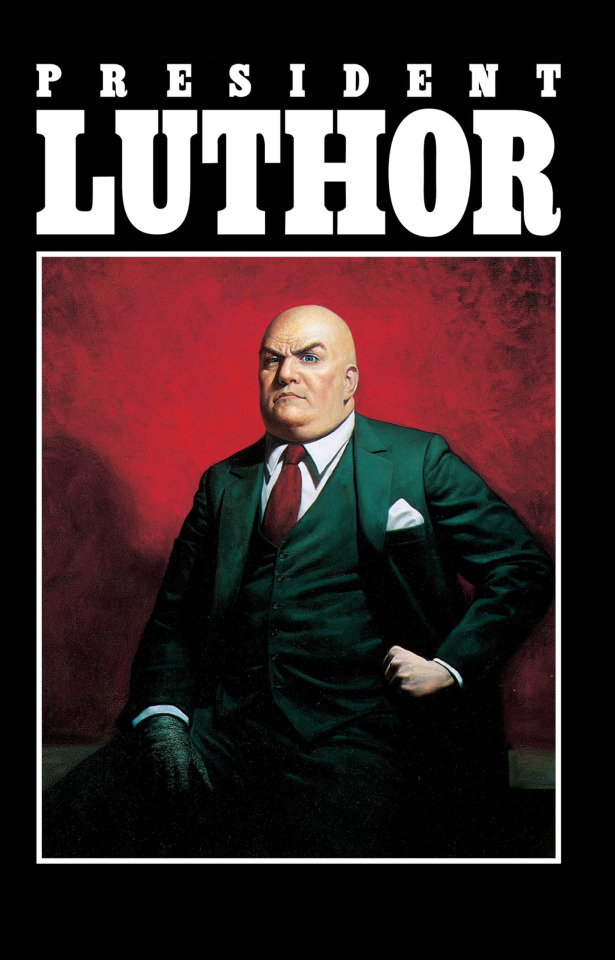
("President Luthor" was a very in depth historical account of the Luthor administration written by political analyst Ronald Troupe. It is the most recommended source on the subject and a book I both own and had to read for a historical ethics class) Luthor, and his supporters are operating somewhere between a deep Randian self delusion as to the nature of power and a very mundane and pitiful kind of bigotry. All mixed up together in a noxious concoction that's been poisoning society at large since the industrial age at the latest and probably far before Randian politics even had a name. Put in order to fully pry apart the Luthorite "philosophy" we need to take them on one at a time. So let's.
In simplest terms Lex Luthor is a bigot. And he's not even a principled bigot. He hates Superman, the Martian Manhunter, aliens and metahumans and magic users because they have power that he doesn't and have the ability to protect themselves from the dominion that he feels he is owed. He knows people are easier to control when they are kept divided from one another and that anger and hatred sells better whether he's selling weapons to Bialyan dictators or selling xenophobia to the American electorate.
Luthor, like so many heartless billionaires before him sees his own success as both anointing and justification. The final stop on the crazy train of the capitalist prosperity gospel. He's rich and successful and therefore is also a moral good because only good people, smart people, wise people are gifted with success and power.
I hate to tell you my friend but that is bunk on every level. Lex Luthor is a snake whose success comes from the kind of underhanded skullduggery that ALL success at that level comes from. He's lied, cheated and stolen everything he has ever gained and he's left broken bodies, homes, families and communities in his wake because he simply doesn't care who gets hurt because HIS prosperity is higher. Because he's a business leader, right? And employer? Because he just plain knows how to get shit done. And that? THAT is why superheroes piss him off so bad. Because every time he sees Superman lift up the rubble from a chemical explosion HE caused. He sees the court fees he'll have to pay when his safety violations are dragged in front of a court. He hates to see the Justice League standing as vanguard against existential threats because he calculates in his head how much he could be strong arming the United Nations to paying out for some kind of privatized security force.
Superheroes are too principled to be bribed, too powerful to be threatened, too connected to be divided and too unassailable to be undercut by the newspapers he keeps in his back pocket. He's afraid of them for the same reason McCarthy was afraid of them in the 50s. Because he knows for a FACT that eventually he will step out of line and they will come down on him like a bag of hammers simply because it is RIGHT. He despises Superman because Superman has power that Lex Luthor knows he would abuse. And so he must convince himself that ALL people would abuse them. Because for all his genius he doesn't have the two cents worth of wisdom needed to feel the yawning, flinty pit where his heart was supposed to grow in at some point. And the best part is even DECADES after the world got to see him for who and what he is, when he got impeached by the representatives of our republic for putting life on Earth at risk to make Superman look bad. TWICE. He still has yippy little terriers like you marching along at his heel. And he wouldn't spit on you if you burst into flames.
#dc#dcu#dc comics#dc universe#superhero#comics#tw unreality#unreality#unreality blog#ask game#ask blog#asks open#please interact#worldbuilding#lex luthor
116 notes
·
View notes
Text
So I don't know if I've pulled this post together entirely as I would like to, it's not perfect, but I don't want to linger on it all day so just getting it down was more important to me.
Something I think about often, as an Indigenous person, is the contrast between how people online, especially settlers, or folks with distant Indigenous ancestry but no real connection to their nation, talk about things like the Wendigo, versus how our actual cultures relate to sacred stories, taboos, and the act of carrying those teachings forward.
There’s a modern trend where people treat words like “Wendigo” as inherently cursed or dangerous, almost in a superstitious, horror movie way. You’ll see posts that say “don’t say the word,” “don’t include it in media,” “white people shouldn’t touch this,” "Make sure you censor it," and so on. And while I get that it’s often coming from a place of wanting to protect something, it’s also deeply disconnected from any living cultural framework.
It becomes performance. The loudest voices are usually not people grounded in community teachings, but people trying to wield indigenous people as a kind of online moral weapon.
In many Indigenous cultures, there are story taboos. There are stories that are only told in winter, or only told to certain people, or in certain contexts.
There are stories that are sacred, and not meant for entertainment or casual consumption.
But those taboos are not about silence for silence’s sake, they’re about context, relationship, reciprocity, and responsibility. And crucially: they are ours. They are not content warnings for the internet to enforce. They are part of a living culture that knows when and how to speak its truths.
One example I always return to is the historical taboo against painting sacred stories and beings, a taboo that was challenged by Norval Morrisseau (Copper Thunderbird), an Indigenous artist whose work was, at least to me, absolutely revolutionary. He painted sacred forms to reclaim story and identity for people who had been cut off by colonialism, residential schools, and systemic erasure.
His work wasn’t sacrilege. It was art. And he was criticized, extremely so, by the Elders, but in the end he changed the way we hold those taboos. He made it possible to talk again, to see again. He is one of my heroes.
So when I see people online say things like “don’t even say Wendigo,” it doesn’t feel like protection, it feels like fear. Not fear rooted in spiritual protocol, but fear rooted in settler guilt and internet moralism.
If you're not part of a nation, or you’re not grounded in those teachings, it's not your job to police sacred boundaries based on someone else’s cosmology. Your job is to listen. To understand why a taboo exists, who it protects, and how it lives. Because not everything sacred is forbidden, and not everything forbidden is yours to defend, and not everything you think is forbidden is actually forbidden, and not everything actually forbidden should stay forbidden.
We preserve culture by carrying it, not by locking it away, not by mimicking silence, but by understanding the weight of what we choose to speak.
And part of why this matters so deeply to me, why I feel so strongly about the difference between performance and lived tradition, is because art is not just a hobby or a pastime for me. It is sacred. It is divine.
Art is not just what I do; it is who I am. It is how I connect with the world, with spirit, with others, with grief and joy alike. I create because it is a form of prayer. Because it is a way to breathe. Because when I write, draw, create, speak, I am reaching through time, not just as myself, but as part of something old, wounded, and despite that, still alive.
I believe deeply in artistic freedom, not just in principle, but in practice. I do not believe art should be censored to appease the comfort of those who do not share in its context. I believe in the right to speak, even when the subject is painful. Especially when the subject is painful. Because if we cannot speak pain, we cannot heal it.
And that’s why, when it comes to the Wendigo, I will not take part in the moral panic around its name or its depiction.
I carry the teachings and fears of my people in my body. I know the stories, not because I read them in a horror anthology or watched them on TV, but because they are part of the world I come from.
And I carry that weight into the choices I make as an artist.
I do not treat it as a cursed word that must never be uttered, never depicted, never grappled with. I treat it as a truth, ugly, dangerous, hungry, starving even, that deserves to be met with eyes open.
The art taboos of my ancestors were real. There was a time when sacred stories were not to be painted, not to be shared in certain ways. And yet that taboo was not the end of the story.
I believe I and others too, have that right, just as Copper Thunderbird did.
Yes, some people, many of them strangers to the culture they claim to protect, may find my stance uncomfortable. But I can live with that. I have to. Because I live with far worse. I live with the ghosts and absences colonialism has left behind. And frankly, the living memory of that spirit what it means, and what it consumes is far more real to me than online discourse.
I am more concerned with preserving the power of art than I am with preserving a silence that was already fraying under the weight of history. I honor my elders, and I honor the stories. But I do not mistake the past for a cage. I will carry what I have inherited into the future, with care, but not with absolutist reverence.
Let me create. Let me speak. Let me offer the truth of what lives in me, even if it is hard to look at. Especially then.
That is what I believe art is for.
And as long as I'm being honest;
I’m not particularly concerned with whether white people use the Wendigo in horror movies.
I understand why some folks feel protective, especially in diaspora or reconnecting contexts, when so much has been taken, the scraps feel like they matter. But I don't think this is the battleground we should die on. The Wendigo is not some uniquely special, sacred figure immune to horror depiction. It’s not a god, not a story reserved only for ceremony. It’s a warning. A lesson. A spirit of consumption and decay and hunger and greed and myriad other things, and those are things everyone relates to I'm sure, so I can see why it happened, also they're fucking scary so yeah no shit it happened.
I’m not saying “anyone SHOULD do anything they want forever.” I think Native people should be involved in these stories. Should be paid, should be credited, should be listened to. I think if you want to write a Wendigo story, you should at the very least try to understand what it meant to the people who believed in it first. Because that's just respect.
But I’m also saying that I have watched my people die from real hunger. From real poverty, overdose, housing loss, despair. I have seen firsthand, just what it means to be devoured by something much larger than yourself.
And that, not some dumb horror movie monster is where my fear and my grief lies.
If a white person misuses a story, I might sigh, I might roll my eyes. But if someone uses a story well, if someone takes the myth and reshapes it with care, with horror, with beauty, and with craft, I’m not going to chase them down screaming about "misuse." Because frankly, we have bigger problems.
And we have bigger, scarier monsters.
I don’t want “representation” that amounts to gatekeeping scraps.
I want sovereignty.
I want land back.
I want our languages and waters and children safe.
I want Native artists to be funded, housed, heard.
We are not fragile. Our stories are not fragile.
Let them be shared.
I’m sure there are fellow Native people, from my nation and from adjacent ones, who disagree with me on all this. That’s okay. We are not a monolith. We were never meant to be. Our cultures are living, breathing, and full of contradictions, just like any other people.
But I also know that my opinion is not unique, and it is certainly not unpopular within our circles. I support my fellow Indigenous people, always. I want safety and sovereignty and self-expression for us all. But on this? On this one? We’ll just have to disagree.
And I can live with that.
129 notes
·
View notes
Text
Moving to Japan many years ago and being introduced more meticulously to its culture, history, and philosophy sparked a deep and lasting fascination that took root within me. Through extensive reading, research, observation, and reflection, it offered me valuable insights that, for some reason, blended organically with my own Balkan mentality. Japanese thought is like a quiet, endless ocean - vast and mysterious, yet full of deep truths for those curious to explore its depths. It’s not only that we can learn from it - it’s that we are drawn to it. The soul, restless and searching for meaning, finds itself captivated by its quiet elegance, by wisdom that is not shouted but whispered, like a secret offered in the stillness of the night. Herein lies its true beauty: it doesn’t force itself on you, it invites. It calls the spirit to explore the unknown, to face its own shadows, and in doing so, to find peace.
Here are a few philosophical principles that I find deeply compelling, each reflecting a unique idea or value within the expansive spectrum of Japanese aesthetics, ethics, and spirituality:
In the philosophy of "kensho" (見性), the gradual awakening to one's true self, there is a calm defiance against the rush of modern life. How easily we are deceived into thinking self-worth is built overnight, but Japanese thought insists on a far more patient, sometimes demanding journey - a slow, deliberate peeling away of the surface until only the real essence of the self remains. This is not comfort, but truth, and the search for truth is never without a bit of struggle. Yet in this struggle, in this slow awakening, there is beauty - one that cannot be grasped by those who seek only the fleeting joys of instant satisfaction.
Much like "bushidō" (武士道), the way of the warrior, this journey demands honor, integrity, and the kind of inner strength that does not waver, no matter how treacherous the path, a kind of inner strength that stands resolute in all circumstances. Bushidō embodies Gi (rectitude), Yū (courage), Jin (benevolence), Rei (respect), Makoto (honesty), Meiyo (honor), Chūgi (loyalty), and Jisei (self-control). It is not simply enduring hardship - it is about living with powerful intention, where loyalty, integrity, and courage form the foundation of a purposeful life. This spirit of Bushidō isn't about suffering but about a fierce dedication to living with honor and resilience, and within that struggle, one’s character is shaped. There is no arrogance in true confidence, only a hard-won resilience, the kind that grows in the cracks like a delicate flower breaking through stone.
Then comes "shibumi" (渋み) - that quiet, understated elegance that goes almost unnoticed, simplicity hiding a depth of complexity. True self-esteem, true understanding, doesn’t need to shout. It exists in the way a person holds themselves, moves through the world with calm, steady presence that speaks volumes without saying a word. This is confidence born not from pride but from humility, from understanding one’s place in the larger order of things, and finding peace in that awareness.
The beauty of "wabi-sabi" (侘寂) lies in its celebration of imperfection. It rejects the idea of flawless perfection and instead finds beauty in the cracks of imperfection and flaws. There is something both bittersweet and freeing in this acceptance - that we are all, in some way, broken, and it is through those very fractures that we find our true beauty. It’s a perspective that would resonate deeply with Dostoyevsky, who found humanity in the brokenness of his characters.
Perhaps the greatest gift of Japanese philosophy is the concept of "yūgen" (幽玄), that deep, elusive beauty lying just beyond reach, in the shadows and the unseen. Life is not meant to be fully understood, and some things are better left as mysteries. This unknowable depth gives life its meaning, its richness. The surface may seem dark, but beneath lies an entire world for those willing to look deeper, to feel with their soul, rather than just see with their eyes.
Finally, there is "fudōshin" (不動心) - the unshakable mind. To be calm, to be still, in the face of the storm - that is where true strength lies. It lies not in the victory and worldly achievements, triumph or success, but in the calm, steady enduring of life’s storms. This is the magnetic presence that draws others in, not through force or charm, but through the quiet power of someone who has faced the abyss and emerged, not untouched, but unbroken.
In Japanese philosophy, I’ve found a mirror to the human condition - beautiful, tragic, profound, and endlessly deep. It teaches us that self-esteem, like life, is not something to be attained in a moment, but something to be continuously sought, patiently, through humility and acceptance. There is no end to this journey, and in that endlessness lies its greatest beauty.
#personal entries#japanese philosophy#cultural reflections#wisdom and resilience#philosophical musings#見性#kensho#武士道#bushido#渋み#shibumi#侘寂#wabi sabi#幽玄#yugen#不動心#fudoshin#日本#japan#soulful insights#musings#hero's journey#january 11
129 notes
·
View notes
Text
Is love to be earned? Musings on one of Canto VIII’s themes

“Under Mercy, all shall be made equal”
Chesed. The Kindness and Mercy of God. His all-encompassing love that accepts and joins all, for only God fully understands your heights and depths, your best and your worst. Thus, it’s no coincidence that Dante’s awakened to its corresponding Sapling of Light’s ability in the Canto whose Sinner is the kindest of all, the one who couldn’t bring himself to hate his siblings, parents, and elders.
But such a thing really goes against what we hold as common morality, right? It’s alright—No, you must hate those who bring you and others harm, and not to forgive them as long as you want even if they have changed or are in the path to do so. Doing the contrary will certainly win you some disapproving/confused glares… Why does that sound familiar?
“Xinchun: ... Right. I guess... if it was anyone else among my siblings, they would have sent their lackeys after us already... Or... maybe I'm not even worth that much effort already.”
“Dissapointed Audience: We raised that failure as our own son? What a pathetic disappointment… Excited Audience: Don't worry... I have faith in our third child. I mean, it's not like we expected anything from this one, right?”
“Wang Qingshan: We've sacrificed so much of ourselves... just for this day... just for the Family Hierarch war… […] If I fail here miserably... having accomplished nothing... they might kill me when I get home… I have to do something, anything... to be a proud sister to my little siblings…”
“Shi Sijing: Father... Please forgive me... I should've done better than this…”
“Xue Baochai: But maybe they'll use a different treatment method on [Xue Pan] this time. Hopefully they'll edit him to be more obedient to mother's commands this time around~”
“Hong Lu: When a child is born, they aren’t celebrated—they are hidden, concealed for years in the dark, so that competition wouldn’t take notice of a new rival…”
Surprisingly, how collective morality can twist itself into the monstrosity that we see in the inhabitants of Daguanyuan. Every family readies itself to kill or be killed to achieve what they want, and impossible standards are put in children.
Certainly, most people would think our society—our ethics—can’t possibly be the same as Daguanyuan’s, but that’s a vile lie. The 2 systems are rooted in the same principles, on the threat that people do not deserve love if they don’t fulfill the standards and rules imposed upon them by others, that they are monsters that deserve to be insulted and gutted for daring to betray others’ expectations, no matter if they are kids or their parent, stranger or friends, or even the ideas we have of people
Truth to be told, it’s near impossible to escape such feelings and gut reactions, and as luck would have it, we are particularly good at pointing fingers, especially towards our parents and older relatives, those who raised us and were supposed to give us unconditional love. But things are always more complicated than that, aren’t they? We would love to always be the good guys, to receive love and care despite our flaws, yet when we have to do so with others…
Certainly, we can blame the Elders and Hierarch of Hongyuan for this. But at the same time, they were victims of that very same thing, weren’t they? Shi Miyin and the past Hierarchs were unconscious of that fact, they never understood what their search for immortality truly implied: just as the river goes down the mountain to the sea and the Sun rises and sets, so does the human life grow and withers away, acting as fertile soil for the next generation. Nature, after attaining the highest level of development, will forever descend into the dark embrace of the unknown, falling apart against the wishes of society and the collective.
“So for many people all too much unlived life remains over—sometimes potentialities which they could never have lived with the best of wills, so that they approach the threshold of old age with unsatisfied demands which inevitably turn their glances backward.” - Carl Jung, Structure and Dynamics of the Psyche.
The wish for immortality is a manifestation of the fear of death, which in turn is a product of fearing life and its disappointments. That is, for the Elders, to die means to have failed their forefathers, their family, and everyone else, admitting that everything they have done was for naught—sacrificies, tears, murders, pain, hatred. The Distorted form of Jia Mu, acting as a mere palanquin for the Xianhuang Worm, a symbol of collective expectations, traditions, and thus fears, with some of the skills’ names and affinities show how little Jia Mu thinks of herself without the Elders—the collective and society—approving of and praising her.
However, immortality is infinite time and duration, and within infinity everything happens and therefore fades into sameness, which runs contrary to what life is about! Immortality goes against nature, and by “achieving” it, the Xianren fully physicalized their own fear of death born from trying to fit with what society asked of them, foregoing their own essence in search of that little, most “worthless” thing called love, the essence of God and goal of nature.
Back in Canto V, Queequeg felt envious of how Abnormalities “know” what they wish, and Ishamel expressed a curious idea of how Whales may feel lonely and try to make more of them to alleviate it. Naturally, this is similar to how Bloodfiends themselves act, and in that context I have to point out how the Manchengan Bloodfiends described the Golden Bough’s light as warmer and gentler than even the one they thought they lost forever—the same light Abnormalities, the unconscious aspects of life, and even the Pallid Whale seem attracted to. And what does the Golden Bough do? It illuminates the mind and manifests it, bringing buried fantasies into the sphere of consciousness, into reality.
The above was just a very long way to say that nature itself wants to be realized. It wants to be lived and known, and the only way to do so is… simply living, experimenting the good and the evil, the successes and failures. Pitifully for us, conscious beings, we are alienated from what surrounds us from the moment we open our eyes, all the while something primal inside us wants to feel connected to it, which is something only achievable by love, the creator and end of all creation. We, thus, yearn for something that is a deeply unconscious part of us, making us seek it in the external world… The rest is history, isn’t it?
“When we were born, our natures were good. Though our natures were similar, our habits made us different.”
But no matter how marred and deformed the body becomes, the repression of the yearning to live will never disappear, for it is our inalienable nature as living beings. Only in the most hopeless of situations is that drive truly lost. So, despite how aberrant they became, the Elders wished to experience all those possibilities they couldn’t live, those “foolhardy, young, witless, and flawed choices” that lead to “an adventure they would have never made,” which isn’t that far-off from how Bloodfiends work, right? A stale immortality that wishes to return to the natural flow of things more than anything, yet inherently tied to pleasure and blood.
Even when despair and stagnation hit rock bottom, the Elders refused to move from the comfortable stronghold they created, surrounded with artificial nature, content with merely watching the adventures, failures and bitterness their souls longed for. They watched and watched, but never dared to understand what they witnessed, because that would have meant they lived incorrectly and did everything wrong, that they are not worthy of the “love” and “respect” they desperately fought for.
With all of that said, then Hong Lu perfectly acts as the foil for the Elders and Shi Miyin: they are people who refused to follow what life—their own selves—had in store for them, merely witnessing from afar as everything that ends is ultimately meaningless. Only the eternal, such as Danguanyuan and its traditions, has any value, for it will never disappear and change, showing that they have done something worthy. To dream big and sacrifice oneself for the collective are the only correct ways to live, and Hong Lu soon learned that despite lacking such ambitions to begin with, seeing the way he lived as meaningless.
“Jia Qiu: Each heart has a different cause that moves them. How can one speak of the fathoms of a lake when all they have seen is the water’s surface?”
Kong Qiu, by contrast, is the antithesis of the Elders: he experienced the depths of despair the day the Kong family was eradicated, failing in every single way the standard by which Danguanyuan’s inhabitants judged the world. However, despite temporarily falling into a deep hatred for the world, he walked beyond the prison of Hongyuan, into the vast City filled with flaws, disappointment, and hope, and “by the age of 30” he firmly stood up against society and its delusion that there was only 1 way to be and act, as represented by his EGO, Érli. He essentially became what the Elder could have been if they had not been broken, the “perfect man” by which life becomes realized and known, accepting the walks of life and flows of people, but only as long as they follow what their soul and heart tell them.
Fundamentally speaking, then, Kong Qiu has an enormous wellspring of kindness he has managed to perfectly control and manage thanks to the worldly wisdom he has gained. In Kabbalistic terms, this can be understood as Geburah tempering Chesed, or the justice and might of God controlling his kindness to allow the continued existence of creation. Needless to say, his violent but necessary confrontation against Hong Lu shows it the best, as there’s no better guide for the “eternal child” than the adult that experienced the worst of life.
And so, we finally arrive at Hong Lu’s final realization.
“So what if we can race against the wheels of death? If we are always running, we can’t behold the sceneries.”
The Elders and Hong Lu shared the fear of the meaningless represented by death and temporality. They ran and ran to not be hurt more than what they already were. They closed themselves into their respective lands of illusions, warding off the violent and bitter waters of life that dictate the flow of time itself, as Hubert wisely stated. But at the end, after witnessing what the Sinners and Kong Qiu have done for him, Hong Lu decided and exposed himself to the risk of failure, for life is teleology par excellence—seeking its own descent and end as the culmination of its existence.
But more importantly… Hong Lu understood the Elders were no different than him and everyone else from his family. They were much of a child as he was, that even his beloved grandmother was a “little girl” before the eyes of collective tradition and morality. So, instead of killing them in a fit of anger guided by his disappointment, he shared his kindness and love with Elders one final time before closing the doors of their self-created, interminable hell isolated from the world and its refreshing waters.
“Hoping that through my finder you’ll find another answer.”
Love is the creator of nature, its conqueror, and humanity is alienated from nature since its birth. But if his older brother and friends fought for and won him, who is to say the Elders can’t be saved? It may be meaningless, they surely won’t change, but he wants to give them that last mercy.
It may acquire diverse shapes and forms depending on their circumstances and necessities, yes, but Hong Lu knows very well how important it is to feel loved, independent of what people do, for that is what everyone yearns inside their hearts.
Post-Commentary
There’s not much to say here, really. I think the post already speaks for itself. At most, I think the ideas may be somewhat clunky and dispersed? The topic is really dense, so trying to summarize it like this feels lacking. The Divine Comedy certainly describes the same idea, though with harsher lenses (akin to Kong Qiu’s).
Outside of that, the only thing I can rescue is that my appreciation about Shi Miyin can potentially apply to Jia Huan at some level, thanks to Qiu’s comparison. I don’t think his usage of the “Contempt, Awe” EGO is just as simple as him being a “professional hater,” as we know the Spiral is just as susceptible to having its own pride broken and hating itself.
So, with that said, until the next post!
(please, someone steal my computer)
93 notes
·
View notes
Text
I believe very strongly that if you want to be an ally to marginalized groups, you should absolutely read and watch material bigoted against them.
This is because one of the big things that radicalization pipelines benefit from is the principle I've seen framed as "milk before meat", where they feed you palatable, easily digestible ideas, often with a kernel of truth, in order to work you up to the core of the bigoted ideology. If you go to the meat first, you will choke on it. This will make you more easily able to spot it when they try to feed you the milk, and more resistant because you know the meat it's building up to.
There are two keys. First, you need to start with the meat, and second, you need to read it with a sharply critical eye.
If you're looking to read something fatphobic, for example, Harry Potter may be a great mainstream example, but it's in a way that is so culturally acceptable that it can slip by if you aren't looking for it. "None For You: How Fat People Are Ruining America and the Planet and What You Can Do About It", on the other hand, is rather obvious in its biases, allowing an amateur to see them clearly for easier interrogation of the premise. Most bigoted material can be acquired by piracy or through your local library. This is one of the big reasons that libraries stock bigoted material.
Then, start noting down all of the things that the material says that seem to make sense, or that you are sure are true. There's no shame in this. Bigoted ideas are ingrained in your upbringing, and on top of this, a lot of bigots will take real problems and build on them in ways that are bigoted.
For instance, anti-immigrant sentiment in the USA is often bolstered by the fact that wages in the USA are effectively decreasing, along with job security. They say that this is because immigrants are taking the jobs, decreasing the amount of value that is available to USAmericans. To a USAmerican who does not know much about immigrants, but does know that their paycheck buys less and less, this sounds like a plausible explanation.
Then, later, look up exactly what they are saying. What are the real issues? (Racism and unchecked capitalism.) Why are they being used to bolster this argument? (Because it takes the heat off of powerful people and puts it on powerless ones, redirecting the hate to people it can more easily hurt, which satisfies the rage of the USAmerican, drives a wedge between them and immigrants, and takes heat off of the powerful.) What are real ways to tackle the real issue? (Solidarity with immigrant workers, especially undocumented ones, unions, and working for better social safety nets.) Why did I fall for that? (You did not have enough information.) Can I notice this rhetoric in the future and avoid falling for it? (Yes.)
Know that many of the ideas you encounter will be normal. Much bigotry is normal. Normal is not automatically good or right.
Know that there will be useful ideas interspersed with some bigotry. A lot of people with useful ideas have been bigots. This does not mean we must discard their ideas, nor that we must accept the bigotry. It does mean that we need to critically examine the ideas to see if they are rooted in and/or affected by the bigotry, and if it is possible to effectively remove them from their bigoted origins, or if the bigotry is so wound into the ideas that they is no longer useful if you wish to avoid harming the group the thinker was bigoted against.
This is difficult work to do. It is intellectually intensive, and emotionally exhausting. You will start seeing bigotry in all kinds of places, including media you thought of as "good" and "progressive", and that will also be emotionally exhausting and dispiriting. It will also mean that you are no longer passively absorbing those bigoted ideas because you settled on the idea that this media is "good" and that as long as you only consume "good" media, you will be free of bigoted ideas- a premise that is disturbingly popular for how incorrect it is. Knowing how to recognize and discard bigotry in works is far, far more useful than flatly refusing to consume more overtly bigoted works.
One way to make it easier is to form reading groups, so that you can lean on each other when reading something that's affecting you badly. It also means that there's more than one person processing the bigotry, so other people might notice more subtle parts of the bigotry that slipped past you in your own reading, allowing you to have a fuller picture of the book. If you can't form a reading group, more famous bigoted works often have criticism available online for you to read through. Remember to do your own research. What makes doing this so valuable is increasing your own ability to detect bigotry and to think critically about material you are consuming.
You do not have to limit yourself to traditional media, either. There are forums and social media bubbles that are hotbeds of bubbling, seething bigotry that is more extreme and repugnant than the vast majority of published work. Reading these conversations can be useful for the exact same reasons that reading overtly bigoted books, articles, letters, and essays can be, and they often contain more up to date dogwhistles. However, this is a riskier move. Social media is built to make you keep scrolling, and you can easily find yourself at your wits end and vulnerable to a bigot whose rhetoric is slightly less obvious than the others. In addition, it can be tempting to interact- at which point the bigots will either attack you or try to recruit you, both of which are damaging to you. Only read the conversations of bigots if you are well supported and have strong impulse control, and read them in small doses.
You are not immune to propaganda, but you can partially inoculate yourself into being less vulnerable by consuming it in controlled circumstances that match your ability to recognize it as such and reject it.
2K notes
·
View notes
Text

The Harm of Physical Discipline on Black Children: A Garveyite Perspective on Abuse, Colonial Trauma, and the Need for New Approaches to Parenting
From a Garveyite perspective, which champions self-determination, empowerment, and the uplifting of Black people globally, the physical discipline of Black children—often normalized in many communities—is a direct result of colonial conditioning, intergenerational trauma, and an internalized acceptance of oppressive tactics. This form of discipline, though widely practised, ultimately hinders the development of strong, confident, and independent-minded Black youth who can lead the charge toward liberation.
This analysis will explore why physical discipline is a legacy of slavery and colonial rule, why it contradicts Garveyite principles of Black self-empowerment, and why alternative methods rooted in respect, understanding, and cultural restoration are necessary.
1. The Colonial Roots of Physical Discipline in Black Communities
Many Black families defend beatings, whoopings, and corporal punishment as “tradition,” but in reality, this practice is a remnant of colonial rule and slavery rather than a cultural legacy of African societies.
Fact: Pre-colonial African societies relied on communal discipline, verbal correction, and rites of passage to instil values in children—not beatings inspired by slave masters.
Example: During the Transatlantic Slave Trade, slave owners brutally whipped and beat enslaved Africans to instil obedience through fear. This method of control was later internalized and passed down through generations.
Example: Colonial governments in Africa and the Caribbean used severe physical punishments to enforce European laws on Black populations, reinforcing a hierarchy of control based on violence.
Garveyite Takeaway: If beating children was an effective and righteous method of discipline, it would have empowered Black people under slavery rather than kept them in a state of fear and submission. If it did not liberate us from white rule, why should it be used to prepare our children for liberation?
2. The Contradiction of Physical Discipline and Black Empowerment
Marcus Garvey’s teachings emphasized the need for strong, independent-thinking, and self-disciplined Black individuals to lead the charge for global African liberation. Physical discipline directly contradicts this vision in several ways:
How Physical Discipline Weakens Black Children Instead of Strengthening Them:
1. It Instills Fear, Not Critical Thinking:
A child who is beaten does not learn why their actions were wrong—they only learn to fear punishment.
Fear-based discipline leads to obedient followers, not revolutionary leaders.
2. It Damages Self-Worth and Identity:
Black children who are frequently hit may internalize self-hatred and associate discipline with violence instead of wisdom.
How can we tell Black children they are kings and queens while treating them like enslaved people?
3. It Perpetuates the Cycle of Oppression
Many Black parents justify beatings by saying:
“I do this so the police won’t have to.”
This statement is an admission that corporal punishment is a tool of white supremacy, used to “prepare” Black children for life under oppression instead of preparing them for liberation.
Example: Malcolm X, Huey P. Newton, and Marcus Garvey were not obedient, fearful children—they were defiant, critical thinkers who challenged the status quo. We need leaders, not people conditioned, to obey authority without question.
Garveyite Takeaway: We must stop preparing our children for submission to oppression and start raising them to become liberators and builders of Black power.
3. The Psychological and Emotional Damage of Physical Discipline
The Scientific and Psychological Evidence Against Beating Black Children
Numerous studies confirm that physical punishment leads to negative long-term effects rather than producing disciplined, successful adults.
Research has shown that children who experience corporal punishment are more likely to:
Develop low self-esteem
Exhibit aggressive behaviour in relationships and society
Struggle with mental health issues like depression and anxiety
Be less likely to challenge authority, even when that authority is unjust
Example: Many Black adults defend beatings by saying, “I was whooped as a child, and I turned out fine.” However, if we examine how much internalized trauma, anger, and distrust exist within the Black community, it’s clear that we did not “turn out fine.”
Garveyite Takeaway: A truly free and empowered people do not need to rule their children through fear—they lead them through wisdom, cultural education, and self-determination.
4. The Double Standard: Black Children vs. White Children
One of the most dangerous consequences of normalizing corporal punishment in Black households is that it prepares Black children to accept violence as normal, while white children are often raised with nurturing and encouragement.
How This Affects the Black Community in the Long Run
White children grow up being told they can achieve anything—Black children are often told they need to be beaten into obedience.
White children grow up to become bosses, entrepreneurs, and leaders—Black children, conditioned through fear, are often expected to follow rules instead of challenge them.
The system punishes Black children more harshly in schools, knowing their own parents won’t fight back against abusive authority.
Example: Black children are three times more likely to be suspended or expelled from school than white children for the same behavior—yet Black parents still tell their children to be quiet, obey, and never challenge authority.
Garveyite Takeaway: Beating Black children does not protect them—it only weakens them while their white counterparts are being raised to dominate the world.
5. A Better Approach: How to Raise Black Children for Power and Liberation
If physical discipline is a product of oppression, then the solution is to return to African-centered parenting methods that build strong, confident, and intelligent Black youth.
Garveyite Alternatives to Physical Discipline:
1. Restoring African Values of Communal Discipline
In African societies, elders disciplined through community correction and mentorship, not through beatings.
Teaching, storytelling, and cultural reinforcement were the primary methods of guidance.
2. Rites of Passage Programs
Black children need structured rites of passage to transition into adulthood, teaching them responsibility, self-discipline, and leadership.
3. Building Self-Discipline Instead of Fear
Encourage critical thinking and accountability instead of forcing obedience.
Teach children to analyze their actions and take responsibility without violence.
4. Lead by Example
Many Black children experience hypocrisy from parents who demand respect but show none.
Children learn from watching—if they see strong, disciplined, and intelligent parents, they will embody those traits.
Example: The Nation of Islam emphasizes self-discipline, structured education, and accountability over beatings, producing many strong, disciplined leaders.
Garveyite Takeaway: We need Black children who think critically, move strategically, and act boldly. This will never be achieved through fear-based parenting.
Conclusion: Breaking the Chains of Slave Discipline
The physical discipline of Black children is not cultural—it is a practice forced onto us through colonial rule and slavery. If we are to build a strong and liberated race, we must break the cycle and return to African-centered, Garveyite principles of discipline through empowerment, knowledge, and cultural restoration.
Final Thought
Marcus Garvey did not build the UNIA by beating his followers into submission—he inspired them through discipline, knowledge, and leadership. If we want strong Black leaders in the future, we must raise children who are strong in mind, not just fearful of punishment.
#black history#black people#blacktumblr#black tumblr#black#pan africanism#black conscious#africa#black children#black family#Stop Hitting Kids#EndCorporalPunishment#self discipline#black excellence#black parenting#break the cycle#black liberation#black empowerment#rites of passage#african traditions#Garveyism#marcus garvey#Garveyite
108 notes
·
View notes
Quote
The five Justices in the majority opinion, however, went farther than necessary to insulate insurrectionists from being disqualified from federal elections. They didn’t just rule that states cannot disqualify Trump, or Presidential candidates, but rather that states cannot disqualify any insurrectionist candidates for federal office. The Justices gave all the power to a notoriously dysfunctional Congress to do so, even though Section Five did not explicitly make Congress the sole enforcing authority of Section Three. As in the Dobbs case that overturned 50 years of Roe v. Wade, the conservative principle of “judicial restraint” does not exist with this Supreme Court. Republicans like to blast “activist judges,” but as we see yet again, an “activist judge” is just someone who rules against you. Under the Supreme Court’s expansive ruling, a state is currently unable to disqualify a candidate for federal office who engaged in insurrection, even if that person has been charged and convicted of insurrection. Even a federal court would be unable to bounce an insurrectionist from the ballot absent a law enacted by Congress.
There's No Restraining This Activist Supreme Court
This SCOTUS needs to be burned to the ground and rebuilt with actual Justices, instead of these unelected activists who are opposed by nearly 8 in 10 Americans.
The Courts are not going to save us. The Courts aren’t even going to enforce existing laws that were written to protect us. The Courts are actively working against Democracy and doing everything The Courts can do to hasten Fascism’s hold on the levers of power. Fascism has already come to America. It is taking root in every state that is under Republican occupation, urged on and enabled by this SCOTUS majority, and their ideological partners in the House and Senate. The only way we can stop this from spreading like a Zerg creep over all of America is to overwhelmingly put Democrats into office and then force them to act.
If Congress won’t do something to limit the grotesque abuses of power by people who don’t interpret the law, but make law from the bench, it will be up to America to rise up and demand action.
I refuse to be ruled by 6 Christofascist Nationalists, and I refuse to sit quietly while people who have the legal means to do something throw up their hands and furrow their brows.
This is going to be our last election that matters, if we don’t.
I’m serious. If Trump somehow gets into the White House again, we will never have another election in my lifetime.
LISTEN TO ME: any vote that is not for Joe Biden is a vote to end Democracy in America. Any vote that is not for a Democrat is a vote to end Democracy in America. When I see people insisting they won’t support Biden or Democrats because they aren’t Left enough, I want to pull my hair out. The stakes are too high for all of us -- especially the most vulnerable among us -- to indulge temper tantrums.
It’s a very simple choice: you can vote for Biden and Democrats, or you can vote to turn America into a Christian Nationalist Theocracy, ruled by autocrats.
This will be our last free election, if Republicans are not resoundingly and forcefully rejected at all levels.
585 notes
·
View notes
Text
Arcane 2 Trailer time!

Imagine this chick comes into your office and tells you what to do? What are you gonna do?? Tell her no?????
Overall Ambessa and Sevika are really making this season MILF o'clock.
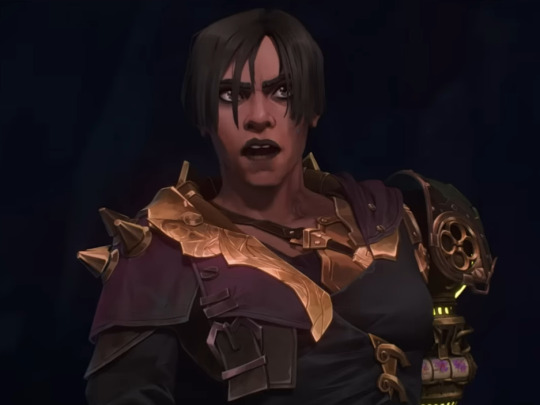
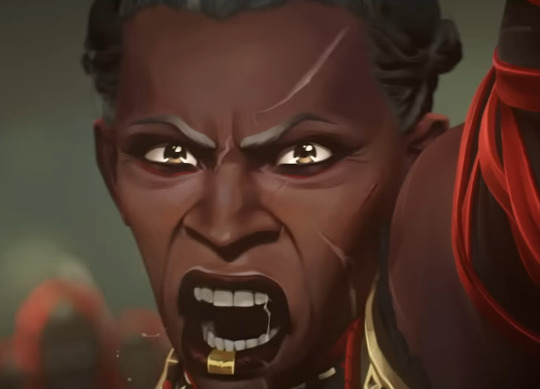
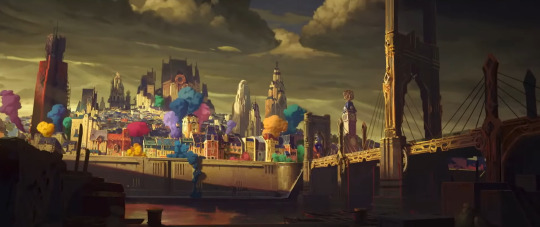
It would seem that early season will focus on Jinx terrorist time...
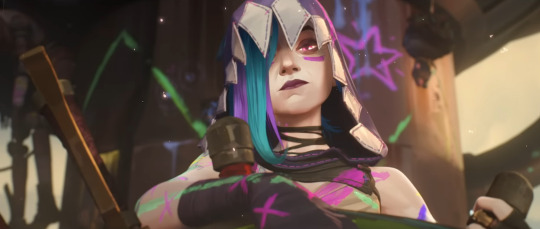
This is sadly the only LoL skin she could afford...
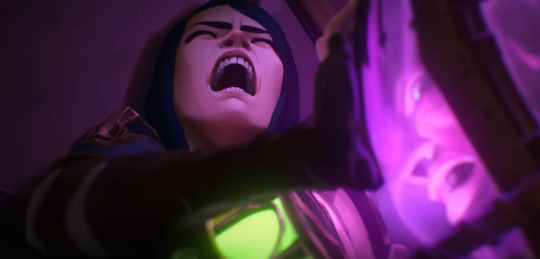
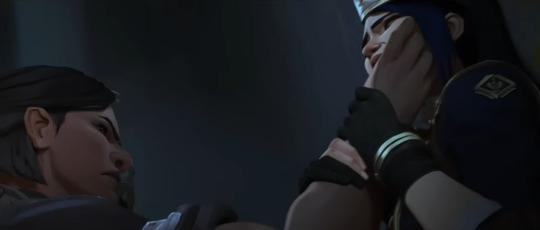
If you like Cait AND you like your women in pain/getting squeeze like they're a pineapple in the werewolf fucking press, then it seems this season is going to be for you. But Cait isn't the only one having a bad time, seems like Heimerdinger losing his day job led to some relaxation of his principles:
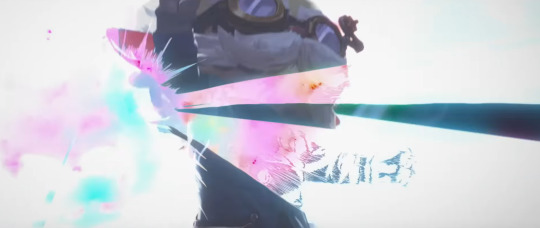
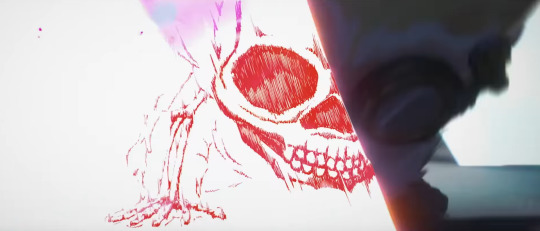
Now focusing on Ekko, who we know is helping Heimer:
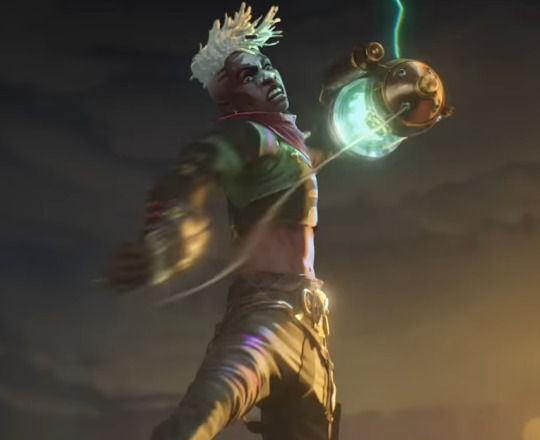
This has a chain to pull a mechanism, and we see some similar thing being pulled by an unknown character, just a much thicker chain.
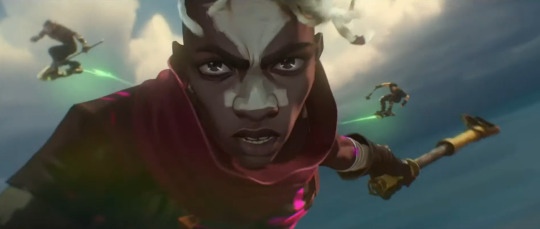
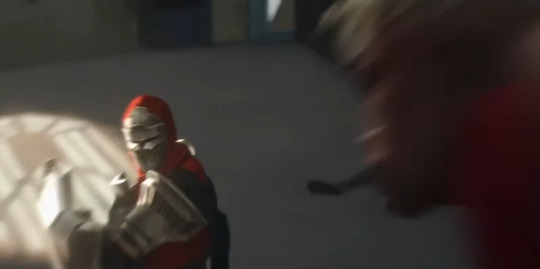
These shots of the Firelights attacking AMBESSA's people lead me to believe that the story may look like > Councillors listen to Ambessa > The tensions with Zaun escalate > Jinx terrorism instead of resolution > Vi sees this as failure and returns to Zaun to try another way > Ambessa doesn't take no for an answer > everyone teams up against Noxus, bringing Zaun and Piltover together again.
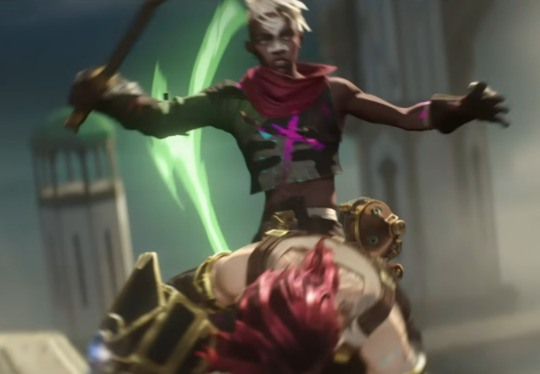
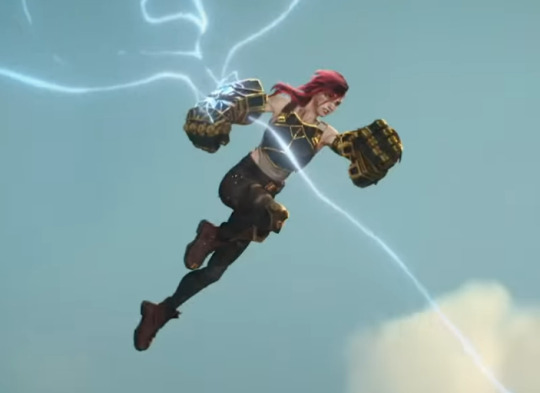
By hair alone we can see a timeskip here. Love Ekko's outfit. Vi's simpler style with just a bit of Piltie chest armour gives me hope that she transitions away from being a Piltie Enforcer and more of a Vander style character, trying to mediate.
Notice how dark her roots are???? I am wondering because LOOK:
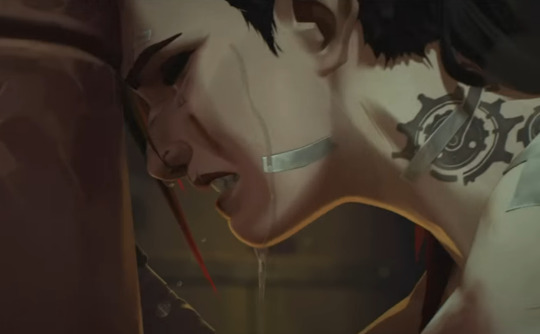
She has black hair!! With reddish tips?
SO THIS MEANS THIS IS VI'S NEW LOOK:
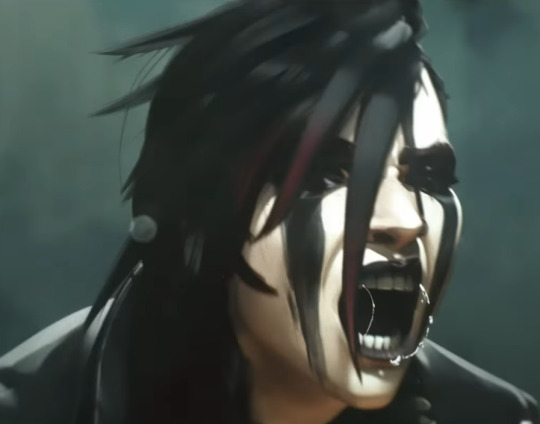
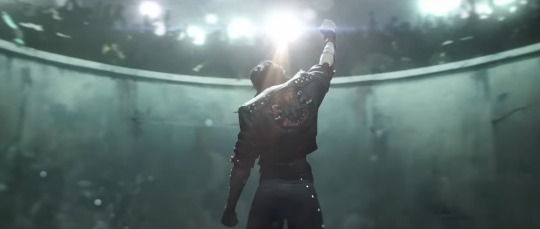
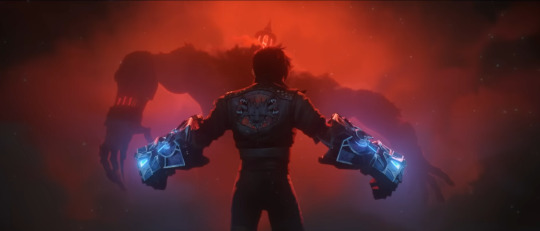
And this last shot confirms it! RHEA RIPPLEY makeover!!!!
PLEASEPLEASEPLEASEPLESAEPLEASE BE REAL please don't be an inforcer don't be a cop please be cool please have an arc learn progress return to your people don't be a class traitor I beg I begwaah
My only criticism of this is that we now have 2 options: Either Vi is entering her goth era and is actively dyeing everything sloppily so that bits of Pink remain, or she has always been black haired, and has been dyeing her hair AND eyebrows pink her whole life, even as a child.
I get that it could be a cultural thing parents do, as my friend En suggested. I'd like this, if it weren't for the fact she was in stillwater for YEARS and I don't see them providing pink dye and a nice setup to bleach and dye safely...
Curious to see how it goes.
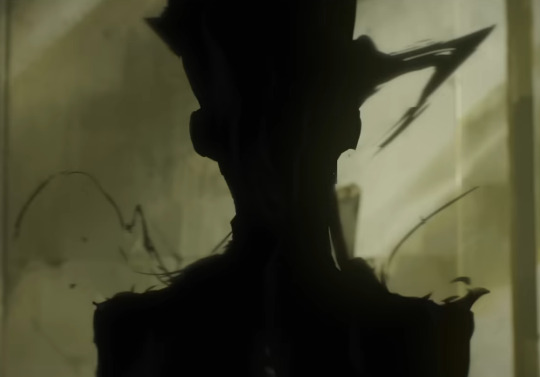
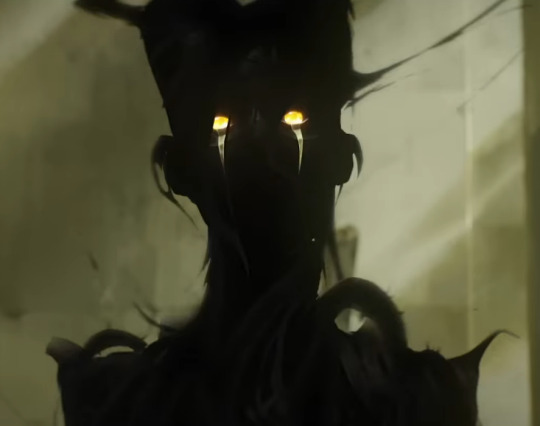
At this I screamed "Silco????" But not sure now. Seems too far off to be a Jinx vision.
There's also fucky things going on with the Arcane. We're told it's "waking up", which is curious because I was assuming mages across Runeterra were using the Arcane lots for their own magic, so very happy to learn more about it.
Also very cool to see a return of the wizard guy from Jayce's backstory:

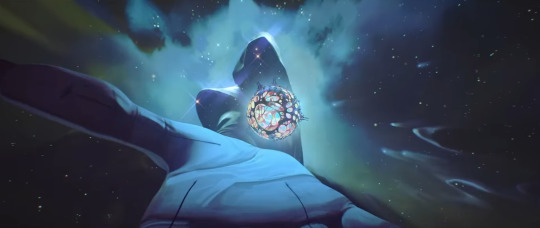
Very excited for these depictions of magic :
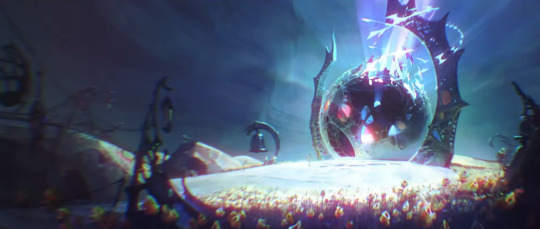
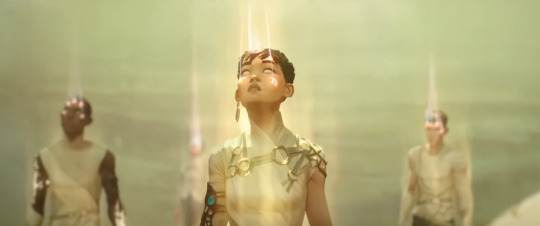

Free feet included.
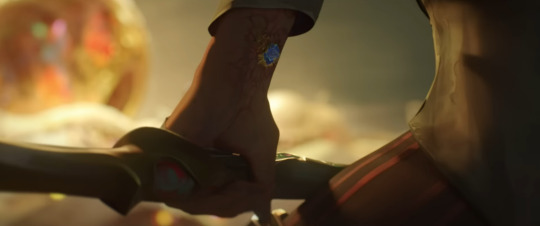
I'm pretty amazed that we have seen Zero Mel and Zero Jayce, and just 2-3 frames of hinted Viktor. Nice to see he'll go through with the transformation, but I'm curious as to why they're keeping the jeyvik divorce era so out of promo. Some of my friends feeling very edged right now.
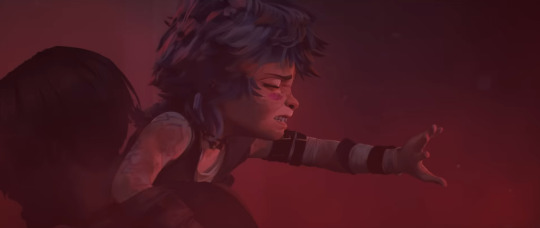
Wondering if this is baby Powder flashbacks, or if we're going to get little kids getting dyed blue in celebration as we see adults do when they team up with her. I suspect if this is a kiddo who wanted to be blue like Jinx, this will be used as a parrallel, with them being caught in an attack that harkens back to the bridge.
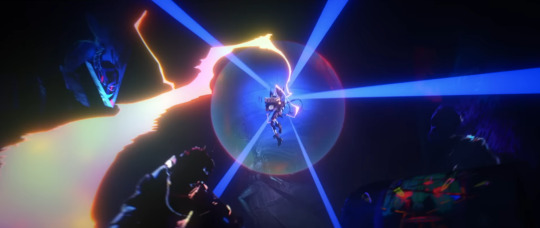
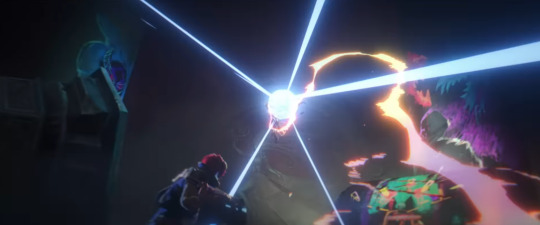
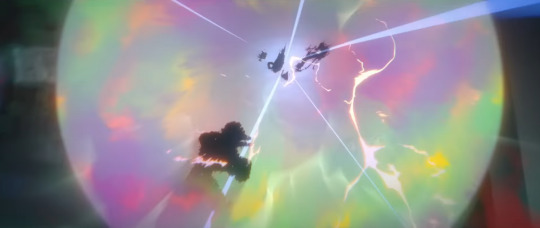
The visual effects look insanely gorgeous, and also Jinx's very bad time tm is always on the menu. Very exciting!
#arcane#arcane 2#arcane season 2#arcane trailer#arcane vi#arcane jinx#ambessa medarda#caitlyn kiramman#sevika#ekko arcane#ekko#jinx#vi#arcane viktor#heimerdinger#noxus#piltover#piltover's finest#zaun#silco#arcane meta#trailer analysis
329 notes
·
View notes
Text
"le plaisir délicieux... d'une occupation inutile"
is the opening quote of dragons dogma II, and its greatest theme is the question of what you will do to a role thrust upon you.. In a sense; if you can even walk away from Dharma, what are the lengths you would go to?
Basically, the dragon represents = struggle, and the arisen is it's chosen hero to wrestle with. The dragon steals the arisen's heart but the arisen doesn't die. Instead it makes them immortal, with the sole mission of standing up to the dragon to restore their heart. This struggle is sort of like the engine that keeps their world going, yin and yang in the most philosophical way. If there is evil, good will rise to stand against it. Pawns are your eternal servants, they're beings pulled from a metaphysical realm, and they only answer to the arisen. But they are basically beings who do not have their own sense of self, no will, no anything. But as the game continues, and they travel with you, they gain a soul through your actions, and they tell the arisen: you do not stand alone. I had my friend's pawn travelling with me when we killed the dragon together. You can have a number of endings in dragons dogma I.
1. You can walk away from the dragon. He kills your beloved for your cowardice, and you are driven insane despite being granted immeasurable power. That the responsibility you walked away from, will still come for you, it will still reckon with you.
2. You can slay the dragon, save the princess, and be unsatisfied in your complacency, in only doing what you're told without doing anything more.
3. it is canon that when you do not have the strength to defeat the true final boss, you become the dragon to look for your own replacement. And
4. You defeat the dragon, and you continue to seek the deeper meaning of the world, and confront the root of everything, who the hell sent the dragon? You find out its this being called the Seneschal, the steward of the world, who has grown weary, and wanted someone to herald the world in their place, someone worthy, brave, principled. In game, the seneschal has no official design. They were a previous arisen who defeated their own dragon, and then face who sent the dragon; The Seneschal- Who manifests in dragons dogma as other, previous players who have already beaten the game: You fight the spirit of another, real player who has already overcome the game. In the game, when you defeat the seneschal and take their place. You get to become a small spirit, and wander around the world, looking at all the friends you made, your beloved, and you can't say goodbye to them, they can't see you, they're just wondering where you are before you take your place as the new steward of the world- or you can literally end your life with a magic sword called the "godsbane" before you can ever become the seneschal, in complete defiance of what the game was building up to, the "dragon's dogma", in a sense.
Cycles are something inherently neutral, a law of the universe where it does not seek a final ending, no rapture. Dragons Dogma 2 is built on the same narrative. But when you open the game.. it just says "dragons dogma." And people were wondering, huh. Where's the "2"?
Dragons Dogma 1, has this, totally overwhelming sense of grief. but it also has this, very deep attention to detail. For example, when you fall into the water, your lantern dies. a character with shorter legs; walk slower, can't climb monsters fast, can't run fast. A fat character can carry lots of stuff, and can't be knocked down easily. A skinny character can squeeze in small spaces, can get stunned easily. You can throw oil bottles at something, and then throw a ball of fire at it and it will explode. The thing is, despite being so detail oriented, all the freedom to go and do wherever you go, wherever you please, you are still followed, still restrained by the shadow of a dragon. Every kingdom you go to is bruised by the dragon, evil things crawl out of the depths of the world as a symptom,the coming of a dragon essentially means the end of the world, Unless the arisen comes to stop it. So every character you talk to, every problem you come to solve, from a squabble to a skirmish tells you, please, kill the dragon.
Dragons Dogma 2's secret and "true" ending, is that you have to kill yourself while climbing into a hollow in the dragon's chest, literally climbing into the heart of the struggle.
The. Amount of pain, and loss it took to even just get to the dragon is, overwhelming. When I stabbed the dragon, a ghost from earlier, one who haunted your every step as arisen, the one who sees all,..not a god, more like an enforcer of the laws of the world will appear- they come to you, angry. They thrust you into the sea, trying to bury you. What are you doing?? Because, you strayed from the written rules.. you strayed from the "dragon's dogma".
Illusions of your old friends will appear, and they ask you to come back, finish the story, be the arisen, the dragonslayer. And you refuse. And you are thrust into this, viscera, this world of utter ruin, absolute decay, a merciless world that is completely furious at you for abandoning it. And then. The title drops. Dragon's Dogma 2. Dragons. fucking. Dogma.2. 150 hours in. There's so many aspects and philosophies of the game that become so inherent when you enter this last phase, but.. the title drops there, because you essentially forced the story to tell you another one, carve out a new ending for you and your pawn in the wood of its old foundation.
the game is angry at you, it consumes itself in front of you; you can even sense it gnawing at itself. The more you sleep in the game to heal, the more the map shrinks. But you and your pawn face the heart of the game, one more time, fight the dragon at its core.. and die with your companion fighting. That's how the game truly ends, the world fading into something unknown, something else, different,.. new
82 notes
·
View notes